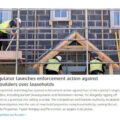| Year | 2010 | 2011 | 2012 | 2013 | 2014 | 2015 |
|---|---|---|---|---|---|---|
| Leasehold Flat Sales | ||||||
| Value of properties sold | £5.12bn | £4.87bn | £5.21bn | £7.10bn | £9.07bn | £11.76bn |
| Total of properties sold | 25,221 | 23,159 | 22,240 | 26,469 | 28,376 | 33,777 |
| Highest price for single flat | £5,900,000 | £21,000,000 | £25,000,000 | £39,000,000 | £50,000,000 | £22,700,000 |
| Leasehold House Sales | ||||||
| Value of properties sold | £616m | £664m | £774m | £1.01bn | £1.38bn | £1.97bn |
| Total of properties sold | 3,420 | 3,484 | 3,893 | 5,033 | 6,286 | 8,775 |
| Highest price leasehold house | £1,200,000 | £2,600,000 | £5,750,000 | £13,000,000 | £4,350,000 | £3,300,000 |
| Totals | ||||||
| Total value leasehold sales | £5.74bn | £5.54bn | £5.98bn | £8.09bn | £10.45bn | £13.73bn |
| Total leasehold properties sold | 28,641 | 26,643 | 26,133 | 31,502 | 34,662 | 42,552 |
Land Registry data shows the scale of the leasehold market ¬ and reveals the importance of freehold sales to housebuilders.
Research by the Leasehold Knowledge Partnership shows that £64.8 billion of leasehold sales were registered in 2015.
£13.73 billion of that was new-build residential property.
From this information, we can roughly estimate the level of income from sales of the freehold reversions as somewhere between £300-500 million a year.
This is additional profit added straight to the bottom line for developers, with minimal sales and marketing effort.
Few developers openly declare these revenue streams.
In a statement to LKP, Redrow said simply:
“We do not separately publish any ground rent reversion sales we might have. They would be included in our turnover. I cannot comment on individual ground rent transactions.”
One notable exception in the sector is the Berkeley Group. Its 2015 annual report (page 52) states:
“During the year, the Group sold a portfolio of approximately 10,000 ground rent leases [ie freeholds] across some 60 sites for proceeds of £99.8 million at a gross profit of £85.1 million.”
Elsewhere, the Berkeley Group says it built 3,355 homes in the year, suggesting these ground lease sales represented approximately three years building for this firm.
While the average value of the homes built by the Berkeley Group (£575,000 in 2015) is much higher than the norm, the price of freeholds is set mostly by the value of the ground rent, not the value of the flat.
To our understanding, the Berkeley Group continues to use mostly 20 or 25-year multiples for reviews of the ground rent terms.
The 2016 accounts of Barratt Developments declares an income of £51.6 million under “other income … which principally comprises the sale of freehold reversions, ground rents, property management income and management fees receivable from joint ventures”. The comparable figure for 2015 was £34.7 million.
Taylor Wimpey’s 10-year doubling ground rents between 2007 and 2011 have been the subject of parliamentary and media scrutiny. Former Taylor Wimpey customers feel conned by the lease terms and claim their properties are now unsellable.
The company has now launched a “review” into the ground rent terms.
A number of Taylor Wimpey ex-customers are considering legal actions against the conveyancing solicitors, who had been suggested by the developer.
LKP describes these Land Registry findings as provisional because higher numbers of leasehold sales for 2015 were given to the Conveyancing Association under a Freedom of Information request. Here the total was £70.9 billion.
It is suggested this higher figure includes the Land Registry’s valuation of the total value of the property in a shared ownership sale, even though leaseholders will only be paying for whatever share they have agreed to purchase.
Even allowing for some margin of error, the figures in the table show that the value of new leasehold sales has gone up by more than 140 per cent since 2010.
The number of leasehold sales has jumped by 48 per cent, and within that figure the biggest jump has been sales of leasehold houses, which have more than doubled in number.





 Taylor Wimpey ground rent explanation ‘not true’, BBC is told
Taylor Wimpey ground rent explanation ‘not true’, BBC is told





















